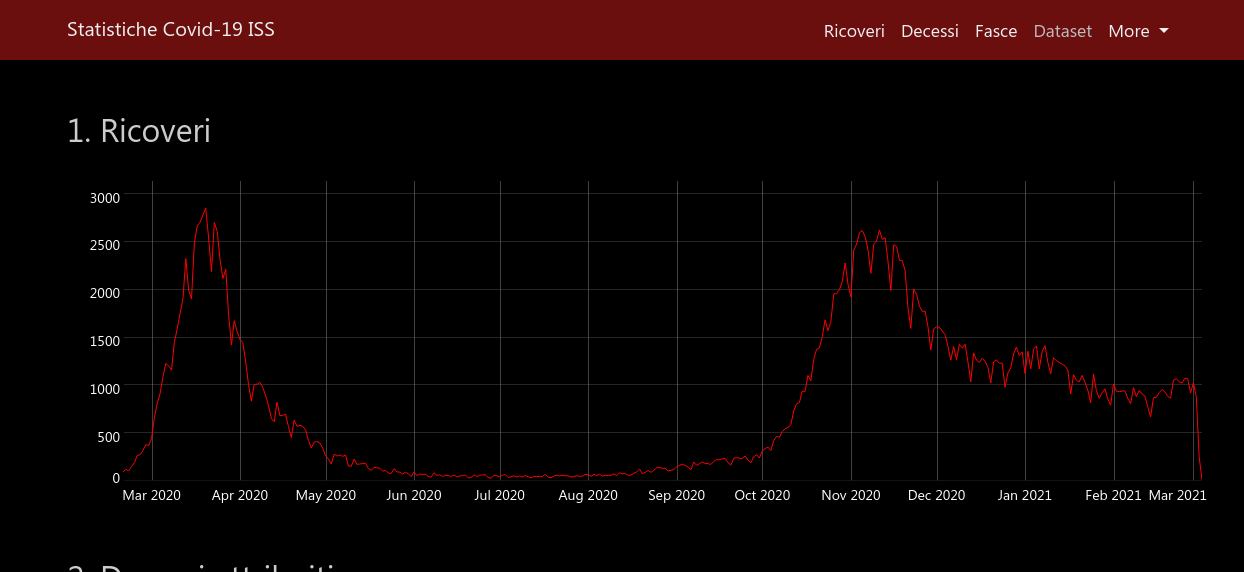Three dashboards
There are many, many problems raised by the modern cult of "data". [1] Here I deal only with the more superficial yet already paradoxical, that is, the frequency with which they are invoked in support of their arguments tends to increase in inverse reason of their knowledge and / or the rigor with which they are considered. That those who flaunt them at every push is often the first to wipe, let's say, their nose. The phenomenon is lately so precise as to give rise to the suspicion, at least in the writer, that it is not just a dialectical malpractice, but rather a grave confirmation of the cognitive distortions mentioned in the note.
Since I too am modern I invite myself , in order not to fall into this fallacy, I have prepared a tool for representing "the data" for my use. These are two dashboards or dashboards that elaborate in almost real time as many numerical series on the disease that is thrilling the world. In the first I propose some extracts from the database of the Our World in Data (OWID) project of the University of Oxford, in the second from the one released by our Istituto Superiore di Sanità (ISS), in the third I carry out some international comparisons on the specific theme of vaccinations. In offering both to the usefulness and criticism of readers, I anticipate some provisional considerations below.
Contagions . While there are strong doubts about the clinical relevance of the infections themselves, both the Italian data (OWID1.1 and OWID1.2) and the international ones (OWID4.1) confirm that their number is significantly correlated to the number of tests performed. The growth of infections in Italy in the last two weeks (OWID1.1) appears much lower when compared to the diagnostic frequency (OWID1.2). The problem of relating the destructive measures of public hygiene to this parameter is therefore strongly proposed.
Lockdown :
- the crude comparison of international data (OWID2.6 and OWID2.7) seems to confirm what others have demonstrated more precisely , that is, that the intensity of the "lockdowns" is not significantly correlated with the clinically serious manifestations of the disease (hospitalizations and deaths). The question of their objectives therefore remains open;
- in the Italian case, the trend of the intensity of closures roughly follows that of serious clinical events (OWID2.4 and OWID2.5) up to about mid-December 2020. From that moment on, and up to now, the two trends are uncorrelated: while clinical events decline, closures remain and indeed increase. The question of the previous point is posed with further force.
Vaccinations . The data collected so far are not sufficient to evaluate the impact of vaccinations on clinical indicators. The only countries that have achieved considerable coverage, but still not sufficient to trigger any herd immunity, are Israel (more than 50% of the population covered in the first dose), the United Arab Emirates (approx. 35%) and the United Kingdom. (approx.30%).
However, a dynamic comparison has been proposed between our country (approx. 6%) and Israel and the United Kingdom in relation to hospital admissions (OWID3.4 and OWID3.5). In the first case, the shares of new hospitalizations in the population follow an almost identical trend in spite of the considerable vaccination gap between the two countries. Indeed, the Middle Eastern republic always has a greater share of hospitalizations. In the second case, the English hospitalizations drop rather quickly with the increase (content) of vaccinations, but they always remain above the Italian ones.
A comparison was also proposed of the increases in deaths attributed to Covid-19 since the beginning of the year (OWID3.6, OWID3.7). In both cases no significant correlations are emerging at the moment, while the value of the United Arab Emirates stands out, where the increase in deaths is in strong contrast with the increase in vaccinations.
The dashboards are available here , here and here . New elaborations will be added in progress.
-
Eg. cognitive (to what extent can the quantity of information be extended by flattening its complexity, without invalidating it?), empirical (can collective information precede and condition individual experience?); epistemic (how much is information that cannot be verified?); politicians (who decides which data they will "decide" instead of the decision makers?); psychological (how healthy is it to reflect on phenomena that cannot be controlled?); ethical and civil (does the fixation on depersonalized and remote references affect the respect of people close to them?) etc. ↩
This is a machine translation from Italian language of a post published on Il Pedante at the URL http://ilpedante.org/post/due-cruscotti on Sat, 27 Mar 2021 08:53:22 PDT.


